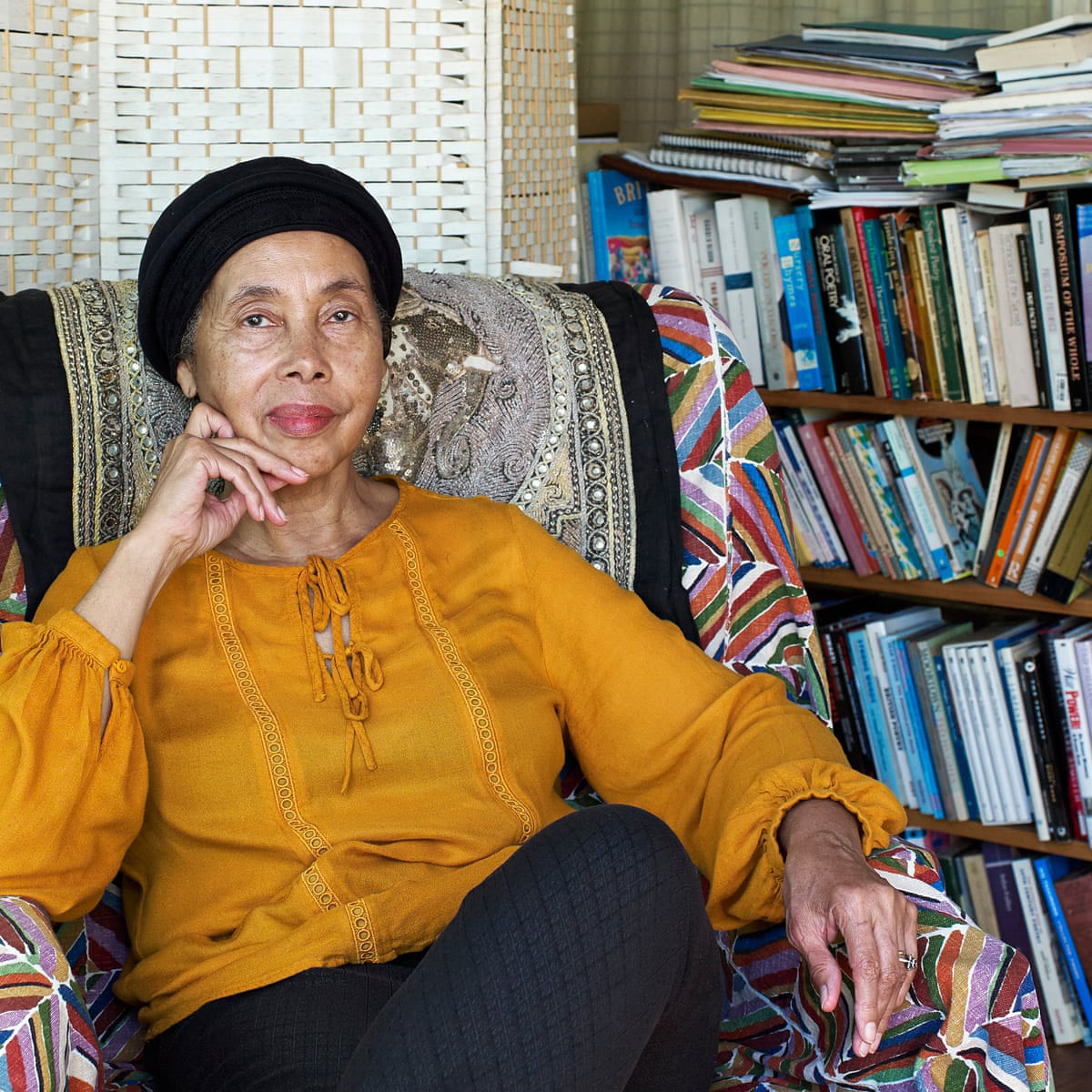From dih pout
of mih mouth
from dih
treacherous
calm of mih
smile
you can tell
I is a long memoried woman
-Grace Nichols
Nanny
Ashanti Priestess
and giver of charms
earth substance woman
of science
and black fire magic
Maroonic woman
of courage
and blue mountain rises
Standing over the valleys
dressed in purple robes
bracelets of the enemy’s teeth
curled around your ankles
in rings of ivory bone
And your voice giving
sound to the Abeng
its death cry chilling
the mountainside
which you inhabit
like a strong pursuing eagle
As you watch the hissing
foaming cauldron
spelling strategies
for the red oppressors’ blood
willing them to come
mouthing a new beginning song
is that you Nanny – Is that you Nanny?
-Grace Nichols
But there were other ships
But there were other ships
rocked by dreams
and fears and promise
Rolling
with new arrivals
across Atlantic.
From the fields
of Bengal
and Uttar Pradesh,
From Kowloon
and Canton.
From Madeira and Ireland –
Their indentured mud-
stained feet, soon embroidered
like the slave’s instep to the fields.
Their songs of exile
their drums of loss
all caught in a weaving odyssey
of no return.
No waiting Penelope
unpicking all her work.
-Grace Nichols
Last Wednesday, January 12, Guyana observed Chinese Arrival Day. It was the anniversary of the arrival of indentured labourers from China to British Guiana. The Grace Nichols poem , “But there were other ships,” addresses that page in the history of Guyana as it salutes the Chinese, Indian and other immigrants who braved the oceans to take up contracts on the sugar plantations of Demerara.
However, that is only one of the several themes explored by Nichols, who was born in Guyana, over many decades of writing poetry and fiction so effectively that she has been recognised and decorated for her work internationally. She lives in the UK and has made telling contributions to English literature through her publications, public readings and intensive involvement in British school programmes. In recognition of that and the overall quality of her work, Nichols was the winner of the Queen’s Gold Medal for Poetry for the year 2021.
The full report in the Royal UK Press Release of December 20, 2021 explained: “The Queen has approved the award of Her Majesty’s Gold Medal for Poetry for the year 2021 to Grace Nichols. The Gold Medal for Poetry was established by King George V in 1933 at the suggestion of the then Poet Laureate, John Masefield, and is awarded for excellence in poetry. Each year’s recipient is from the United Kingdom or a Commonwealth Realm.
“The Poetry Medal Committee unanimously recommended Grace Nichols as this year’s recipient on the basis of her body of work, in particular, her first collection of poetry ‘I Is A Long Memoried Woman’ (1983), prose and several books for younger readers. The Committee is chaired by the Poet Laureate Simon Armitage, who received the Queen’s Gold Medal for Poetry in 2018.”
Nichols is quite well decorated. I Is A Long Memoried Woman won the Commonwealth Poetry Prize in 1983. Her collection Sunris won the Guyana Prize for Poetry in 1996, while her novel, Whole Of A Morning Sky, was shortlisted for the inaugural Guyana Prize in 1987. It is of interest that her husband, Guyanese John Agard, won the Queen’s Gold Medal in 2012 and the Guyana Prize, 1998 and 2000.
About her own work, Nichols commented, “… I’ve celebrated my Guyanese/Caribbean/South American heritage in relation to the English traditions we inherited as a former British colony. To poetry, and the English language that I love, I’ve brought the registers of my own Caribbean tongue.” That much is seen in her poetry, where her style of the Creole is obvious in Long Memoried Woman, while the rhythms and influence may be seen in the other selections.
The novel Whole of A Morning Sky belongs to a group that emerged in the late 1980s, which addresses contemporary politics in a more direct way than the fiction that went before it. Nichols takes her title from a line in Martin Carter’s poetry describing a city set afire by race riots. Nichols’ novel is set in the troubled period in Georgetown of the early 1960s as her heroine witnesses the violence. The youthful heroine here is not one of the more confident if not strident female voices in the Nichols poetry. The poetry engages colourful personalities who speak for themselves, but the samples here include a description of one of the powerful women of Caribbean history.
Nanny Queen of the Maroons is a national hero of Jamaica who emerged in history as a legendary and even mythical personality. The poem makes reference to many of her heroic and spiritual attributes as well as issues of gender. Nanny’s fame as a military leader of the Maroons in their war against the British includes her powers as an obeah woman. While this has been the subject of myth and local folklore, the historians took it seriously. They have documented accounts of obeah as a skill known to be possessed
by African military leaders like Nanny, employing it as healing medicine in battle as well as a mechanism for defence and attack. Nanny has also been celebrated by another strong poet on gender issues – Jamaican Lorna Goodison.
Nichols’ poems here illustrate a line of feminism, but also a bold adventure into modernist form to dramatise important areas of indentureship and Caribbean history. It is, as she describes it, a celebration of Guyanese/ Caribbean heritage while adopting a noted post-colonial slant.











